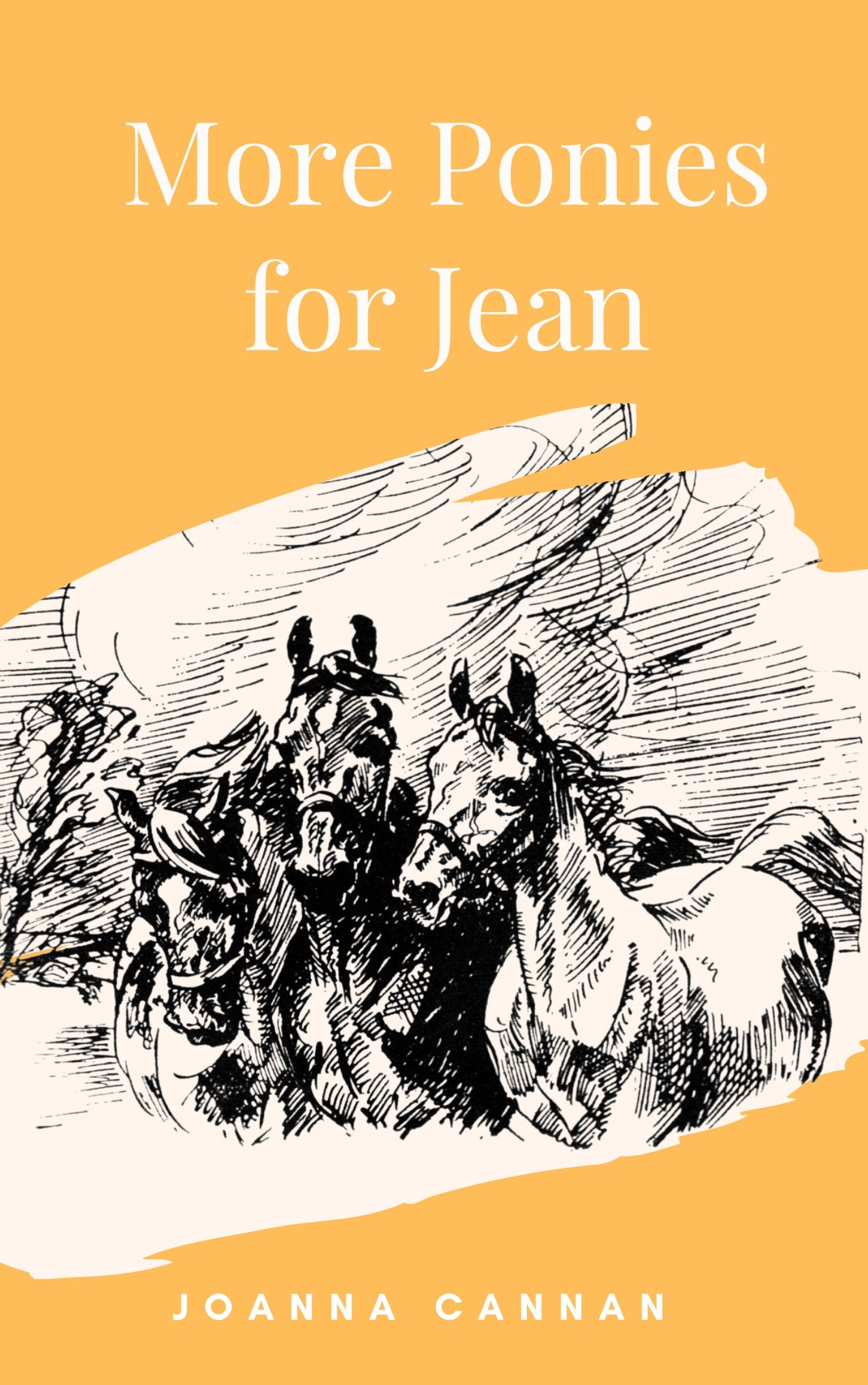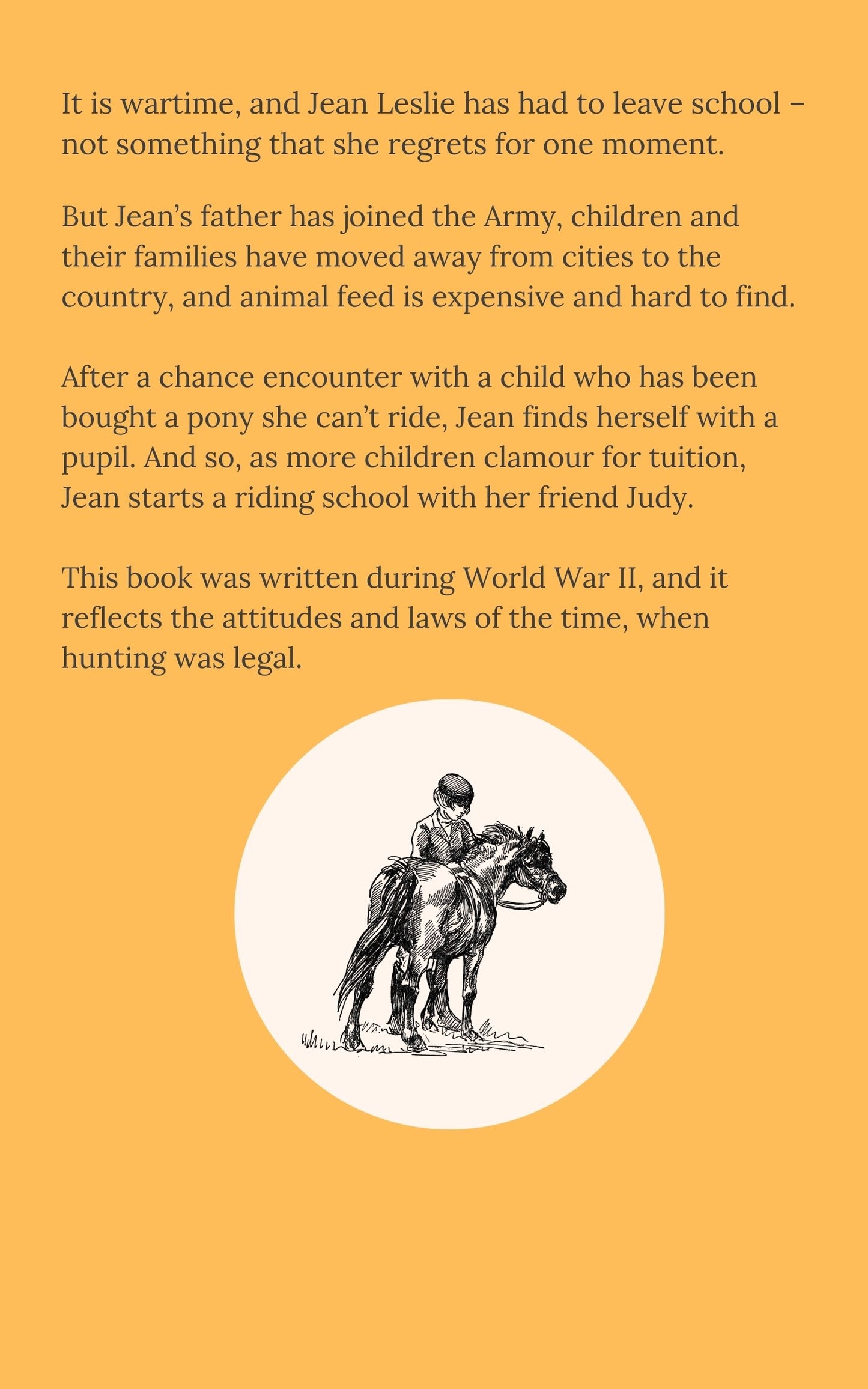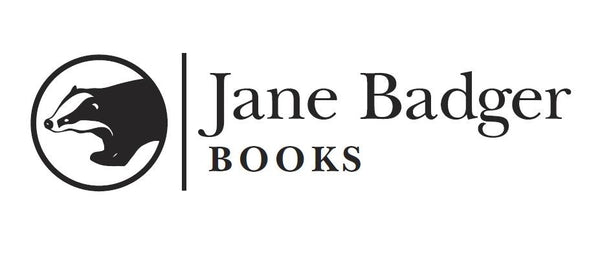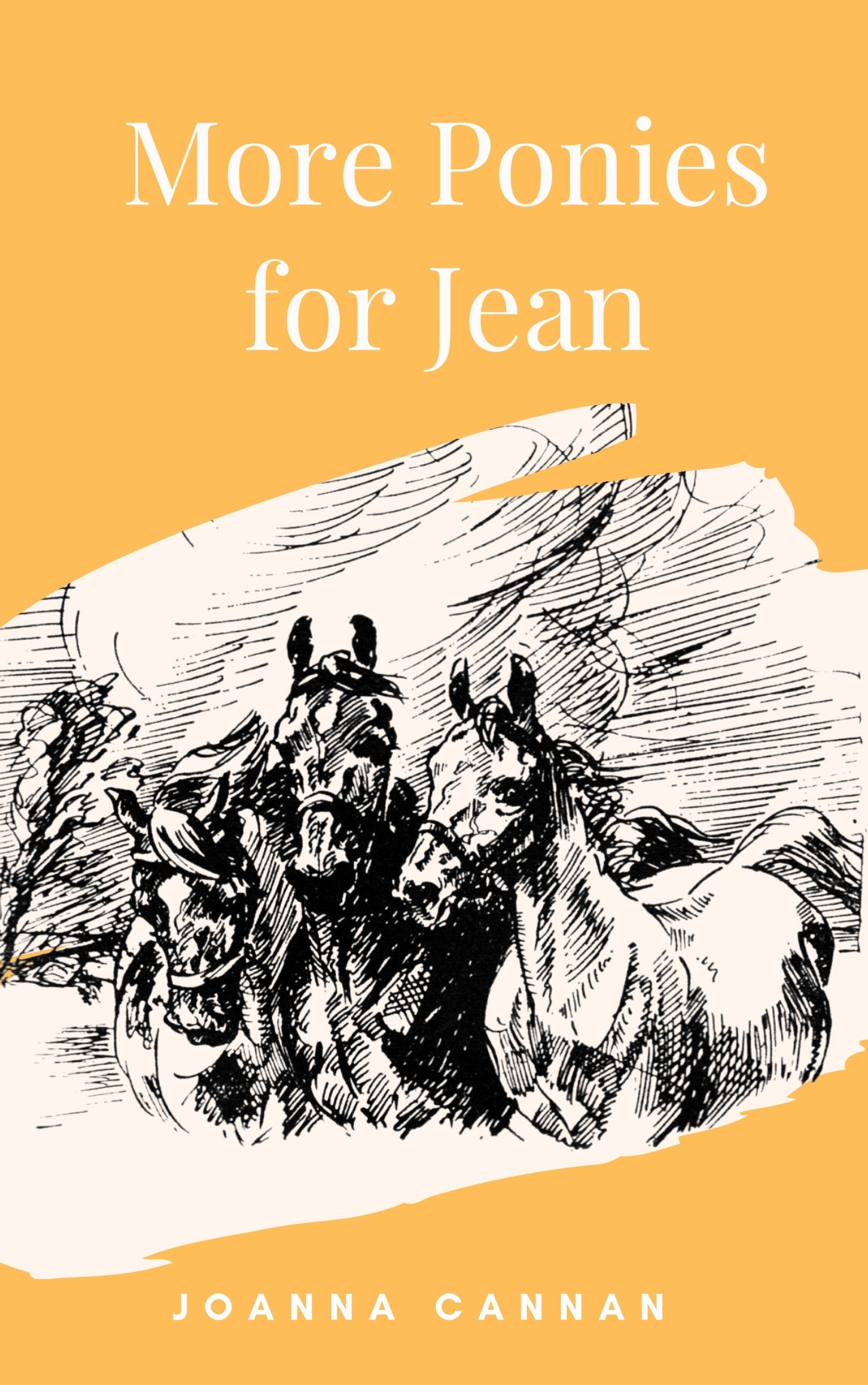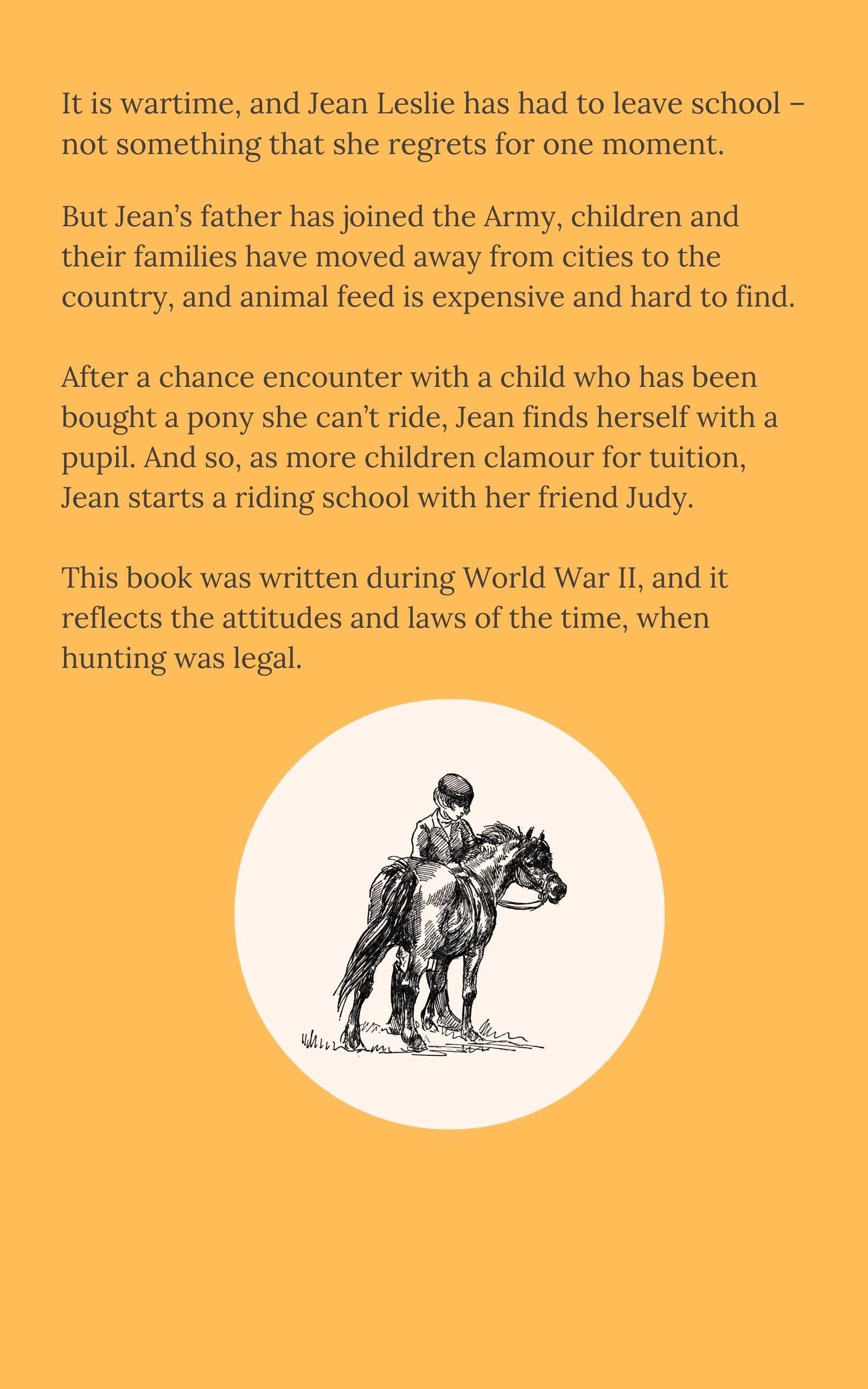Jane Badger Books
Joanna Cannan: More Ponies for Jean (eBook - Jean 3)
Joanna Cannan: More Ponies for Jean (eBook - Jean 3)
Couldn't load pickup availability
Share
It is wartime, and Jean Leslie has had to leave school – not something that she regrets for one moment.
But will Jean have to sell one of her beloved ponies? Wartime means animal feed is expensive and hard to find. Jean's father has joined the Army, and the family don't have as much money. Two ponies are more than they can afford.
After a chance encounter with a child who has been bought a pony she can’t ride, Jean finds herself with a pupil. And so, as more children clamour for tuition, Jean starts a riding school with her friend Judy - perhaps this will be the way she can save her ponies.
This book was written during World War II, and it reflects the attitudes and laws of the time, when hunting was legal.
Jean series 3
Page length: 196
Original publication date: 1943
How do I get my book?
How do I get my book?
There's a link to download in your confirmation email. If you need help, the email from Bookfunnel, who handle our delivery, will walk you through downloading the file that works best for you.
How do I read my eBook?
How do I read my eBook?
You can read the ebooks on any ereader (Amazon, Kobo, Nook), your tablet, phone, computer, and/or in the free Bookfunnel app.
Read a sample
Read a sample
WHEN the war began, my father went back into the army and at half-term I heard to my joy that I was to leave school at Christmas, partly because Castlethorpe was near the coast and apt to be bombed, and partly because my parents, having now only army pay, couldn’t afford to keep me there, and partly because Mummy was all alone at our cottage.
The Headmistress of Castlethorpe, whose name is very suitably Miss Wise, was very cross about it. I was summoned to her study, which is a dark and dismal room furnished in a learned shade of green, and I was given a long lecture about passing the School Certificate and becoming a schoolmistress. The idea of me as a schoolmistress made me laugh, so I got another long lecture about taking life seriously, and at the end of it Miss Wise asked me how I intended to earn my living.
Of course I said I was going to do something with horses and Miss Wise said, “Tch, tch,” and she said that I ought to have higher aims. I said what was the use of having higher aims when you were stupid, and she said I wasn’t stupid, but merely idle and inattentive. We parted in anger and for the rest of the term I lived under the cloud of Miss Wise’s displeasure and was made to work for the School Certificate, even though I wasn’t going in for it, and was given a very small part—only the hind legs of a donkey—in the school play.
If you have read the books about my ponies, which I wrote in the days of my youth, you will know that I have a cousin called Camilla, who was at Castlethorpe with me. Camilla had got to stay on at school, partly because she is a year younger than I am, and partly because her parents, though nice, have not so much imagination as my parents, and weren’t haunted by thoughts of bombs, and partly because they were still rich enough to keep her there.
Camilla is idiotic in some ways and she and I have different ideas of horsemanship and we quarrel over them, but blood is thicker than water and it is better to quarrel about horses than not to talk about them, so at school we had always gone about together. Camilla was very angry because I was leaving school and she wasn’t, and she grumbled all day, and at night she cried and said how was she to get on without me to do her algebra.
All together the last weeks of my school life were dark and dreary and I was filled with joy when, on a perfect hunting morning with a south-west wind and a cloudy sky, my cousins’ large and sumptuous car rolled up the drive, which always reminded me of the far-off days of my infancy when we lived in London—it was as tidy as London parks and you had to keep off the grass and I never did and my father used to get annoyed because my reports said that I persistently disregarded the school rules.
I suppose I was rather tactless on the way home. I made up idiotic rhymes and sang them—or rather shouted them, as I can’t sing. They went like this:
No more arithmetic
To make me sick.
No more geometry
To make me cry.
No more Greek
To make me shriek.
No more gym
To make me slim
and so on, through all the lessons and games for which I could find rhymes. Camilla got very annoyed—of course she still had years and years of lessons and games before her—and presently she said that if I didn’t stop she would tell Perks, her chauffeur, to pull up so that she could push me out of the car and I could walk home. I had just started another series of rhymes, this time about food:
No more rice,
But strawberry ice.
No more hash,
But Haig and splash.
so I didn’t stop, and Camilla told Perks to pull up, but he only said, “Call yourselves young ladies!” and drove on. I said I didn’t call myself a young lady, and Camilla said what did I call myself, and I said I called myself a hard woman to hounds. Camilla laughed scornfully and said I wasn’t a hard woman to hounds; she said I was much too cautious, and I said she was a thruster, so we quarrelled again.
Our quarrel was just becoming deadly when we reached the village of Hedger’s Green and began as usual to shriek out, “There’s the smithy!” and, “There’s Farmer Higgins’s sheep dog!” and, “There’s Mr. Jones’s foal!” A moment later Perks drew up at the gate of our cottage and I leapt out. “See you at the meet on Saturday!” shrieked Camilla. “Right oh,” I shrieked. My quarrels with Camilla are deadly, but they don’t last long. When I had politely greeted my parents—my father had got Christmas leave—and Shadow and Sally, our faithful hounds, and Mrs. Beazley, our charwoman, I rushed to the orchard and there, looking like a perfect light-weight hunter as he stood under the cloudy sky with the south-west wind blowing his mane and tail about, was Cavalier. I called him, and his head went up and he saw me and gave a little whinny and came trotting towards me. Then I heard another whinny and down from the far hedge came Charity in her usual frantic hurry. I talked to them and after the long and dismal term-time it was lovely to be with horses, and especially with Cavalier and Charity, again.
I had scarcely greeted Cavalier and Charity when Mummy yelled, “Lunch!” I rushed, as my father likes you to be in time for meals, but I simply had to go round by the hen-run to see my bantams. Prince Charles Edward Louis Philip Casimer Stewart and Flora Macdonald and Henrietta Maria were getting old now; Flora Macdonald scarcely ever laid, but she sat on other people’s eggs and was still a very good mother, and Donald Cameron of Lochiel, Charles Edward’s son, had three wives, Clementina, Griselda and Hope of Scotland, who all laid beautifully. I found some crumbs in the pocket of my beastly school blazer, so I threw them to my bantams and then Daddy yelled, “Lunch!” so I rushed indoors through the kitchen. Carter, our manservant, had been called up and Mrs. Carter, our cook, had left partly because she wanted to be near him and partly because we could no longer afford to keep her, so the kitchen was sparsely populated by Mrs. Beazley, who stopped eating pickled onions to remark that I had better buck up or the Major would be creating.
I went into the dining-room. My parents had nearly finished lunch, which was cold meat and baked potatoes and trifle or fruit salad. They said I was old enough to be punctual for meals, so we were gloomy for a bit, and then I tactfully asked if my bantams had been laying. Fortunately they had, so we talked pleasantly about eggs until my father suggested that we should keep some more hens—we generally keep about twelve—and I should look after them.
I am not very fond of hens; they are always getting mysterious diseases and dying, and you can’t give them names because you have to be scientific and eat them when they are two years old, and it is not very nice to know that you are eating dear James or darling Matilda, but the chief reason why I didn’t want any more was because they would mess up the orchard. It is a very big orchard, but even without more hens it scarcely provided enough grazing for Charity and Cavalier.
I tactfully said that of course I would look after the hens if we had them, but where would they live? and Daddy said, “In the orchard.” I said, “They’ll spoil the grazing,” and then he said an awful thing: he said that with a war on I wouldn’t be able to keep two ponies. The corn merchant’s bill had been enormous, he said; the price of hay was going up and Mummy was spending all her time and wasting gallons of petrol rushing from corn merchant to corn merchant trying to get it. He said that I could keep one pony but that a second was unpatriotic and unnecessary.
Who's in the book?
Who's in the book?
Human: Jean Leslie, Mr and Mrs Leslie, Judy Charteris, Jane Beauchamp,
Equines: Cavalier, Charity, Micky and Minnie, Hesperus, Topsy, Tom (Black Auster), Red Morning, Tamarisk
Other titles published as
Other titles published as
Series order
Series order
1. A Pony for Jean (not published by Jane Badger Books)
2. Another Pony for Jean
3. More Ponies for Jean
